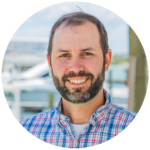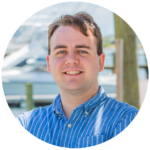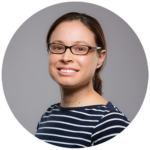XPONENTIAL 2023
SPEAKER SCHEDULE
A workshop led by:

Ross Eaton
Director of Marine Systems
and Principal Scientist
Ross Eaton
Principal Scientist and Director of Marine Systems
Ross S. Eaton is a Principal Scientist and Director of Marine Systems in the Sensing, Perception, and Applied Robotics division at Charles River Analytics, an R&D company. He leads the development, demonstration, and marketing of Awarion™, Charles River’s autonomous maritime lookout system. Ross has nearly 20 years of experience, including ship detection and classification that support COLREGS compliance on uncrewed surface vessels, surface situational awareness, and multi-modal whale detection. In addition, his research spans into several areas of computer vision, including hardware-accelerated object detection and tracking, GPS-denied localization, and automatic image quality assessment and enhancement.

James Everson
Marine Operations
Manager and Engineer
James “Jay” Everson
Marine Operations Manager and Engineer
James “Jay” Everson is the Marine Operations Manager at Charles River Analytics, an R&D company. Jay has over 15 years of experience in the commercial marine industry, including complex marine operations, nautical sciences, and marine systems. He has vast knowledge of controlling complex engine, propulsion, and positioning systems, as well as maintaining mission-critical streamlined maintenance systems that are required in some of the most strictly regulated and safety-conscious industries in existence. At Charles River, Jay manages marine assets and operations and contributes his regulatory awareness and extensive offshore experience to position Charles River as a leader in marine solutions. Jay is a Chief Mate Unlimited Licensed Mariner with over 10 years seagoing experience in leadership roles aboard advanced vessels such as ultra-deep water offshore drilling, supply, and inspection.

Jacob Riedel
Software Engineer in Sensing, Perception,
and Applied Robotics
Jacob Riedel
Software Engineer in Sensing, Perception,
and Applied Robotics
Jacob Riedel is an Electrical and Computer Engineer at Charles River Analytics, an R&D company. Jacob develops full-stack software for deployment on complex autonomous systems, including uncrewed robotics platforms, sensor platforms for aircraft, and command and control systems for operators. Jacob is the integration lead for of Awarion™, Charles River’s autonomous maritime lookout system. His expertise includes over-air laser communications and traffic detection using computer vision.
The Design Dream, the Operational Nightmare: How to Ensure that Autonomy Designers’ Efforts Deliver on Operators’ Dreams
Tuesday, May 9, 2023: 11:00–12:30 PM
Room: 110/112
Session Number: XPO23-WK05
Autonomy offers huge potential benefits across society, in the air, land, sea, and space domains. Everyone involved in autonomy development, from designers to end users, regulators, and those involved in deploying and maintaining the supporting infrastructure, is doing their best to realize those benefits. So why is autonomy slow to live up to its promise, despite everyone’s best intentions? We suggest that one continuing challenge is communication failures that lead to mismatches between the understanding and assumptions of stakeholders involved in different stages of autonomy design, development, and the operationalization process.
This workshop will take a playful look at places these communication breakdowns can occur through a fun, hands-on design and test process. Participants will discuss real-world examples of autonomy successes and failures and look for common through lines that lead to these outcomes. A set of key lessons for increasing operational success will be shared, and the workshop will conclude with a discussion of how to apply these lessons to the development and operationalization of adaptive autonomy solutions across the expanding range of operating domains.
Presented by:

David Koelle
Director of Engineering and
Principal Software Engineer
David Koelle,
Director of Engineering and Principal Software Engineer
David Koelle is Director of Engineering and Principal Software Engineer at Charles River Analytics, an R&D company. His work on multi-agent robotic systems focuses on coordinating decentralized, heterogeneous, and autonomous platforms to achieve mission objectives even in the face of degraded communications or performance. Dave has over 27 years of experience in AI, complex systems, operator trust in analysis systems, and usability engineering. Before joining Charles River Analytics, Dave developed software for business intelligence, pioneered a decentralized system for managing resilience for a next-generation network operating system, and developed controller displays for international air traffic control systems.
A Staged Blueprint for Realizing
Collaborative Autonomy
A Staged Blueprint for Realizing Collaborative Autonomy
Tuesday, May 9, 2023: 2:00–2:25 PM
Room: 104/106
Session Number: XPO23-4848
UAS autonomy enables vehicles to make their own decisions about navigation and other basic maneuvers, thus removing the need for operators to remotely micromanage (via joystick) basic performance of these systems. Collaborative autonomy explores the use of multiple UAS working as a team to address mission-level goals and objectives in a way that optimizes the use of each vehicle’s capabilities. Freed from management of low-level control, a single human operator assigned to the team is able to focus on assessment of higher-order results and related tasking in real-time. For example, a heterogeneous group of UAS optimized for agriculture inspection could be comprised of a high-flying UAS that can scan fields for distressed and diseased crops, other UAS outfitted with effectors to apply specific remediations to problem plants, and even ground vehicles that can be called on for additional assistance to increase the speed, precision, and cost of applying fertilizer, pesticides, weed removal, and other needs. In this talk, we will discuss a blueprint for meeting the challenges ahead of us in the wide-scale adoption of collaborative autonomy, including a series of suggested interim stages that offer increasing value (while limiting risk) to the interested community of operators, developers, and regulators.
Presented by:

Dr. Arjuna Balasuriya
Marine Robotics
Senior Scientist
Dr. Arjuna Balasuriya,
Director of Engineering and Principal Software Engineer
Dr. Arjuna Balasuriya is a Senior Scientist in the Sensing, Perception, and Applied Robotics division at Charles River Analytics, an R&D company. He builds autonomous systems that transform research ideas into practical, usable products used by specialists in their field. Arjuna led Charles River’s development, in partnership with Teledyne Gavia, of AutoTRap Onboard™, a commercial product that applies recent advances in deep learning object detection to locate and classify objects in sonar data. Arjuna has 25 years of experience in the field of marine robotics and conducts research to develop uncrewed, untethered, autonomous mobile undersea vehicle systems that navigate and adapt to changing environmental conditions. Before joining Charles River, Arjuna led the Ocean Observatories Initiative at MIT’s Laboratory for Autonomous Marine Sensing Systems. He has published more than 100 journal and conference papers on sensing and automation and is a senior member of the IEEE and chair of the IEEE OES Information Processing and Data Fusion technical committee.
Challenges and Progress in
Behavior-Based Adaptive Autonomy
Tuesday, May 9, 2023: 2:30–2:55 PM
Room: 110/112
Session Number: XPO23-4833
Today’s uncrewed platforms are typically operated by humans using remote control to guide every detailed aspect of a mission. However, as missions become more complex, there are many scenarios (particularly in the marine and ground domains) in which operators are unable to communicate with these uncrewed platforms in real-time (due to adverse environmental conditions, regulatory restrictions on communications in ecologically sensitive areas, active interference by adversaries, or the desire to remain covert), making it challenging to re-calibrate and update mission and control parameters on-the-fly. Fortunately, significant technical advances in onboard computing power and enhanced sensors offer a pathway to a level of autonomy that can overcome such communications limitations. Behavior-based autonomy architectures enable onboard mission autonomy software to select optimal behaviors for the mission at hand, assess the evolving state of the mission, and adapt to changing environmental conditions. Developers and operators of autonomy systems for challenging environments will gain insights into the importance of onboard behavior and parameter adaptation to the success of long-duration uncrewed platform missions in unpredictable situations and unknown environments. Designers will benefit from a discussion of how multi-objective optimization and reinforcement learning techniques are currently being used to enable assured autonomy onboard these uncrewed platforms.
A panel led by:

Rich Wronski
Division Vice President
and Principal Scientist
Rich Wronski
Division Vice President and Principal Scientist
Rich Wronski, Division Vice President and Principal Scientist, leads Charles River Analytics’ Sensing, Perception, and Applied Robotics division. He manages an extensive autonomous robotics portfolio, leveraging machine learning-based computer vision, sensor fusion, automated object/target recognition and tracking, multi-sensor-based navigation, collaborative autonomy and swarms, and electromechanical engineering for harsh environments. For over 30 years, Rich has focused on accelerating fundamental research through innovative products that meet the needs of his customers across the land, sea, air, and space domains. Before joining Charles River, he served as Director of Custom Products at American Science and Engineering, where he led the development of innovative X-ray based detection systems combating terrorism and trade fraud. Rich speaks regularly on the topic of autonomy, recently joining AUVSI President Brian Wynne’s 2023 Future Forecast webinar as the panel’s technology expert.

Daniel W. Stouch
Principal Scientist and Director of Space and Airborne Systems
Daniel W. Stouch
Director of Space and Airborne Systems
Dan Stouch is a Principal Scientist and the Director of Space and Airborne Systems at Charles River Analytics, an R&D company. For over 25 years, Dan has successfully led many large R&D efforts for customers such as NASA, NOAA, DHS, and various DoD agencies. His work includes an autonomous robotic prototype designed to detect pinnipeds, the group of animals that includes walruses and seals. As part of DARPA’s Hallmark program, he led the development of an XR application for space situational awareness (SSA) and a tool that fuses SSA data in a probabilistic model to analyze potential threats in space. He has completed Squadron Officer’s School, Air Command and Staff College, and Air War College from Air University, and is a member of ACM, AUVSI, MORS, and PMI.
Dan Stouch will be in the panel discussion:
Achieving the Blueprint for Autonomy: The Way Forward from a Trusted Source
5.09.2023 | 4:00–4:45 pm

Stephanie Kane
Principal Scientist and Director of UX Innovations
Stephanie Kane
Principal Scientist and Director of UX Innovations
Stephanie Kane is Principal Scientist and Director in the UX Innovations division at Charles River Analytics, an R&D company. Stephanie is a leading researcher of cutting edge user interface and interaction design approaches across a broad range of commercial, government, and educational applications. For over 15 years, she has managed projects over a wide range of technical disciplines for customers such as the Air Force, Navy, Army, and DARPA. Stephanie’s research is focused on the effective design, development, and evaluation of novel user interfaces. She has extensive experience designing and evaluating screen, mobile, tablet, touch, gesture, auditory, voice, and augmented-reality-based interaction methods.

Ross Eaton
Director of Marine Systems
and Principal Scientist
Ross Eaton
Principal Scientist and Director of Marine Systems
Ross S. Eaton is a Principal Scientist and Director of Marine Systems in the Sensing, Perception, and Applied Robotics division at Charles River Analytics, an R&D company. He leads the development, demonstration, and marketing of Awarion™, Charles River’s autonomous maritime lookout system. Ross has nearly 20 years of experience, including ship detection and classification that support COLREGS compliance on uncrewed surface vessels, surface situational awareness, and multi-modal whale detection. In addition, his research spans into several areas of computer vision, including hardware-accelerated object detection and tracking, GPS-denied localization, and automatic image quality assessment and enhancement.

Dr. Madison Clark-Turner
Scientist in Sensing, Perception, and
Applied Robotics
Dr. Madison Clark-Turner
Scientist in the Sensing, Perception,and Applied
Robotics division
Dr. Madison Clark-Turner is a Scientist at Charles River Analytics, an R&D company, in the Sensing, Perception, and Applied Robotics division. He has extensive experience developing deep learning architectures to address the challenges robotic domains face in applications across computer vision, signal processing, and natural language processing (NLP). Madison’s projects have focused on improving and utilizing NLP for the command and control of teams of heterogenous robots and for the detection, classification, and segmentation of marine mammals and post-natural disaster features from drone imagery.
Achieving the Blueprint for Autonomy: The Way Forward from a Trusted Source
Tuesday, May 9, 2023: 4:00–4:45 PM
Room: 203
Session Number: XPO23-EG05
There exist myriad challenges to overcome in ultimately achieving the Blueprint for Autonomy. Some are complex technically—the opaqueness of AI/ML, the multidimensionality of adaptive autonomy (across land, sea, air, and space domains), and of course verification and validation of these continuously evolving systems. Human engagement with these platforms remains (or should remain!) central to any discussion of autonomy, driving much deep thinking these days by the cognitive engineering community engaged in development of the systems and supporting workflows. Critical to adoption is the need to establish trust in this evolving autonomy—a tall order when there are so many unknowns, not only to end users, operators, and policy makers, but even to developers themselves.
Join us for a practical discussion delving into these very issues. Our panel of domain experts will open that black box, and you’ll take away answers to some of your most pressing questions (and maybe even a clear pathway to solving your own autonomy challenges) no matter your role in the autonomy ecosystem.
At XPONENTIAL 2023, we are featuring our leading-edge adaptive and collaborative autonomy products in the maritime, ground, air, and space domains.

